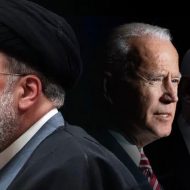The 56th Munich Security Conference this year convened around the topic of ’Westlesness’. The conference report stressed that ‘the world is getting less and less Western’, while debate between the US and European leaders around the ‘collapsing of the Atlantic Alliance’ took center stage at the conference.
At the Munich Security Conference (MSC 2020) this year, 30 heads of states and foreign ministers and ministers of defense participated from nearly 70 countries at the Hotel Bayerischer Hof in Munich where they discussed the crisis in the West, the weakening Atlantic Alliance and Europe’s relations with China and Russia.
The conference focused extensively on tensions between the US and Russia/China, US interventions against Iran, German arms trading activities and cooperation with other countries in the region.
The following themes were also discussed as the side-topics at the conference: ‘Global Solutions for the Global Problems – the Necessity of Defending the Multilateralism in 2020?’, ‘Climate and Security’, ‘Importance of the technology and the trade in the international relations’, ‘Security issues of the Arctic’, ‘International Security’, ‘Healthcare, energy and the technology’.
At the summit, where very heavy security measures were taken, protests against NATO and capitalism gathered at Marienplatz near the Hotel where the conference was held. About 5,000 people gathered for the demonstrations.
The long standing debate around the crisis of the West was discussed during the Munich Security Conference, which is also seen as the “Davos of the global security policies.” The theme of the 50th Davos Summit, which was held last January, was the “Crisis of Capitalism.” The emphasis on ‘Multipolarity’ is particularly noteworthy when discussing the values and the failures of the West today at these summits, which are internationally recognized in areas such as economy and security. The speeches made show that both Asian and Western leaders believe that the hegemony of the US and the supremacy of the West is over.
Another highlight of the conference was the Western alliance itself being opened for debate in the context of these crises. The NATO question, which was previously opened to discussion by Macron’s declaration that “NATO’s brain death” had begun, was once again on the agenda. The NATO question has often been debated, particularly between the US and the European leaders. The comments of Western leaders in the course of responding to each others speeches has once again revealed the ongoing conflict between the United States and Europe.
"In ten years time, I would like to see a #Europe that has enough leverage to act to be sovereign when it comes to policies, to technology, migration, defense, climate protection." – @EmmanuelMacron at #MSC2020. @Elysee pic.twitter.com/wwyLxfSjcJ
— Munich Security Conference (@MunSecConf) February 17, 2020
“Even the West itself has become less Western”
The conference’s director, Wolfgang Ischinger, who had initially declared that the main theme would be “Westlessness”, even included the West itself in this terminology saying that: ”The world has become a more dangerous and lawless place. The West is now having an identity crisis. Not only the rest of the world becoming less Western, but even the West itself has become less Western. That is the phenomenon we call the Westlessness”.
“The US has pushed its European partners away”
Ischinger stressed earlier in the week that the political significance of the West in the world order is no longer the same. In this context, Ischinger criticized President Trump’s one-sided nullification of deals around gun control, the protection of the climate, the banning of landmines and the nuclear deal with Iran, saying that these moves have “deteriorated its relationship with its European partners and pushed them away from the US administration.” Ischinger also criticized Trump’s withdrawal from regions of conflict, accusing him of “leaving Syria’s fate to Russia, Iran and Turkey.”
“The US rejects the international community”
At the opening speech of the conference, German President Frank Walter Steinmeier stressed that the West can no longer shape the world in its own image, saying that “We should not push our foreign policies too hard. Europe and Germany will succeed when they approach the world with a less missionary approach.”
Steinmeier has stressed that its closest ally the United States even rejects the idea of an international community, that the US sees itself above all the other countries: “They say that every country should put its own interests above the interests of others. As if when everyone thinks about themselves, everyone else will be taken care of.” Steinmeier also criticized Trump’s slogan “America First,” saying that the United States is pursuing this policy to the detriment of its neighbors and its allies.“Pax Americana is collapsing”
🇪🇺 "Europe has to develop an appetite for power." Day three at #MSC2020. @JosepBorrellF @ZuzanaCaputova @VeraJourova pic.twitter.com/sEwxbeOKC8
— Munich Security Conference (@MunSecConf) February 16, 2020
Steinmeier pointed out that Germany will celebrate the 30th anniversary of Germany’s reunification this year, stressing that the old global order has collapsed. Steinmeier said: “There was a world where global security was provided by the Pax Americana, and Europe was unified after having been divided by the iron curtain. Right in front of our eyes, this order is now in danger of collapsing.”
“The possibilities we have now are limited” Steinmeier said, adding that understanding this phrase includes learning an important lesson: “we cannot shape the world according to our vision.” He added that there should not be an “expectation of a recovery” with regard to foreign policies.
The new center of American interests is Asia
Noting that Europe is no longer in the center of US interests, Steinmeier said: “We need to invest more in the Trans-Atlantic ties. But for the United States, Europe is not in a central position now like it was back in the day. The US’ declining interest in Europe cannot be attributed only to the current American government decisions because we know that this shift in axis started before now, and it will continue after this moment. Asia is the new gravitational center of American interests and challenges.”
Top 5 takeaways from Munich Security Conference: Spengler, China, Europe, the US and Realpolitik
“We need relations with Russia”
Steinmeier also said that Western countries need better relations with countries such as Russia, and noted that the foreign policy implemented in regard to these countries should not be restricted to condemnations and political sanctions.
“We have failed to find a peaceful solution”
Steinmeier reminded everyone that the UN was established 75 years ago, and stressed that humanity is witnessing increasingly destructive dynamics in world politics because of the ongoing outlook of the “rivalry of the great powers,” and that humanity is moving away from cooperation and unable to find any peaceful solutions. “The traces of this are seen in the conflicts in the Middle East and Libya,” Steinmeier said. In this context, Steinmeier once again criticized the US administration, saying that the country usually disregards the decisions of international institutions which weakens the international community in its search for the solutions to global problems such as the trade wars and climate change.
“The West has weakened in the global order”
Steinmeier was not the only leader who criticized the United States and argued that the West-centered system was weakening. French President Emannuel Macron shared similar views to his German counterpart, saying that:
“Up until 15 years ago, we thought that our values were universal and we would rule the world forever. But when you look at the world today, we will find that the West is weakening in the global order. The United States has been pulling back from Europe and revising its relations with Europe as a part of its policy for some time.”
“We should improve Europe’s independence”
Stating that the US and Europe have now fallen apart, Macron emphasized the importance of ‘Europeanism’ in this context saying:
“Rapidly improving the independence of Europe will be decisive in the upcoming years. Europe has to consider its own nuclear defense industry. I propose from here, to all of our partners who had adopted this idea, to initiate a strategic dialogue on this issue. We need to invest much more in the fields of technology and defense industries. In this way only, Europe can be independent from the United States and China. We need to start a new dialogue with Russia. Sanctions on the Ukrainian issue have not been effective against Russia, yet both sides are struggling.”
The United States is being held responsible
The speeches of the European leaders show that Europe is also shifting away from the US’ dominated system, and that they see how the United States is losing influence in the global order. In this context, European leaders who did not want to be on the loser’s side with the United States blame Washington for the collapse of the Western system, and emphasized the need for a new Europeanism, in other words, moving away from the US and toward an independent Europe. They also forwarded arguments about improving relations with China and Russia in this regard.
Pompeo: claims of collapse have been “exaggerated”
US Secretary of State Pompeo, upon hearing this message from several European leaders, responded to the hypothesis in his own speech. Pompeo said that the argument that the West is weakening is not true: “I am here today to tell you the facts. I’m happy to report that the death of the transatlantic alliance is grossly exaggerated,” Pompeo said. “The West is winning, and we’re winning together.”
Pompeo added that the ones who criticize Washington “have fallen for the enemy’s trap,” and that America is struggling with a variety of threats today such as the Iranians who have made a victim of themselves, the Russians who have declared the Nord Stream 2 pipeline purely an economic project, China advancing Huawei’s 5G technology, etc.
China emphasizes multipolarity
While heated arguments and debates between the American and the European leaders carry on, Chinese Foreign Minister Wang Yi made an all embracing speech: “We must get rid of the East-West or the North-South separatism and see the world as a whole. We must see the international community as a large and a whole family. Multipolar cooperation is needed to overcome the global issues.”
“The right of countries to rise above”
Wang said that humanity should move forward in harmony, and added that: “Multipolarism, stands for the right of all the countries to rise above. If the West wants to live in prosperity and the others to stay behind, that would not be multipolarism.” Noting that there are constructive suggestions available from different countries on how to move toward multipolarism, Wang added: “President Xi has set the following targets for the construction of a multipolar world: Peace, prosperity for all, justice, equality and international law.”
“We will not copy the West”
Pointing out that the Chinese civilization has a 5000-year long history, Wang said, “China will not copy the West and pursue hegemony.” Stressing that China’s technological developments are beneficial not only to itself, but to all humanity, Wang addressed the Western leaders saying, “You should not be bothered by this, instead you should be happy.” Wang has said that no power in the world will be able to stop China’s development.
The values of the new world
China’s mature and embracing attitude and its emphasis on multipolarism has drawn a lot of attention, especially in an environment where arguments between the United States and Europe are so prevalent. In other words, at a conference where the collapse of the Western system was being debated, everyone took particularly strong note of China’s growth in the areas of technology, economy and security, as well as its improving relations with the rest of the world.
At the same time, Chinese Foreign Minister Wang Yi introduced the values of the new multipolar world order, opposing them to Western values which have all but collapsed.
Comment by Diet Zeit
In the article entitled “Searching for the Lost West” by one of Germany’s most influential newspapers, Die Zeit, it is noted that “Europe is becoming increasingly squeezed between two fronts.”
“This year, the Munich Security Conference showed one thing with a dramatic clarity: the Americans are now seeing the West only as a bastion against China. Secretary of Defense Mark Esper’s speech was literally a dare to challenge China. According to Esper: ‘China is the Pentagon’s biggest problem.’”
Working in collaboration with Allies and partners, we advance our strategic interests as outlined in the National Defense Strategy. In Munich, at the D-ISIS ministerial & @MunSecConf, I engaged in constructive discussions on shared goals for global security & stability. #MSC2020 pic.twitter.com/qVfczXJLPW
— Secretary of Defense Dr. Mark T. Esper (@EsperDoD) February 17, 2020
The American speakers warned Europe about doing business with Huawei. Nancy Pelosi warned that, “If you do not want to end up like the Chinese people, do not follow their path.” According to Mike Pompeo, Huawei is China’s “Trojan Horse.” In fact, Secretary of Defense Esper even suggested that NATO itself is under threat, pointing out that if Beijing is able to tap the system, it will be impossible for western intelligence agencies to share information between one another. Washington’s pressure (and Beijing’s counterpressure) has become so intense that it is now feared a moment will arrive wherein Berlin will have to decide between its biggest trade partner and its closest ally. It is no surprise that the Chancellor is trying to find a way to accommodate his decision to approve investment in Huawei.









Leave a Reply